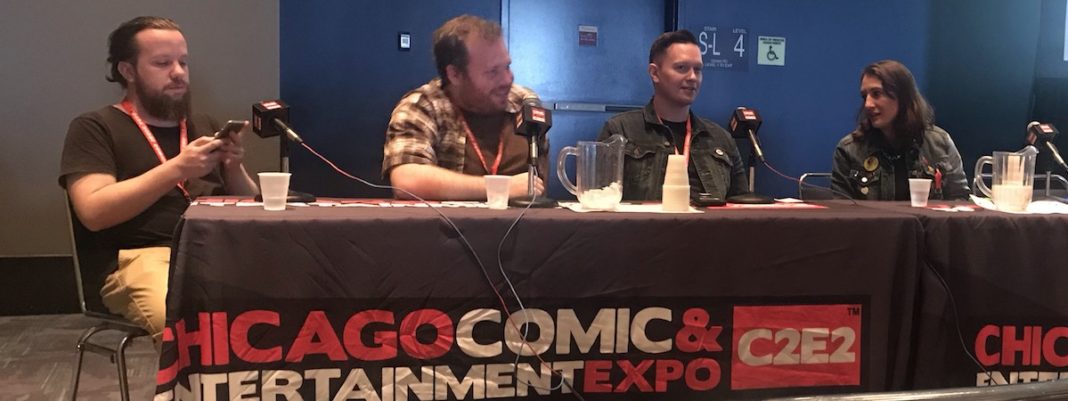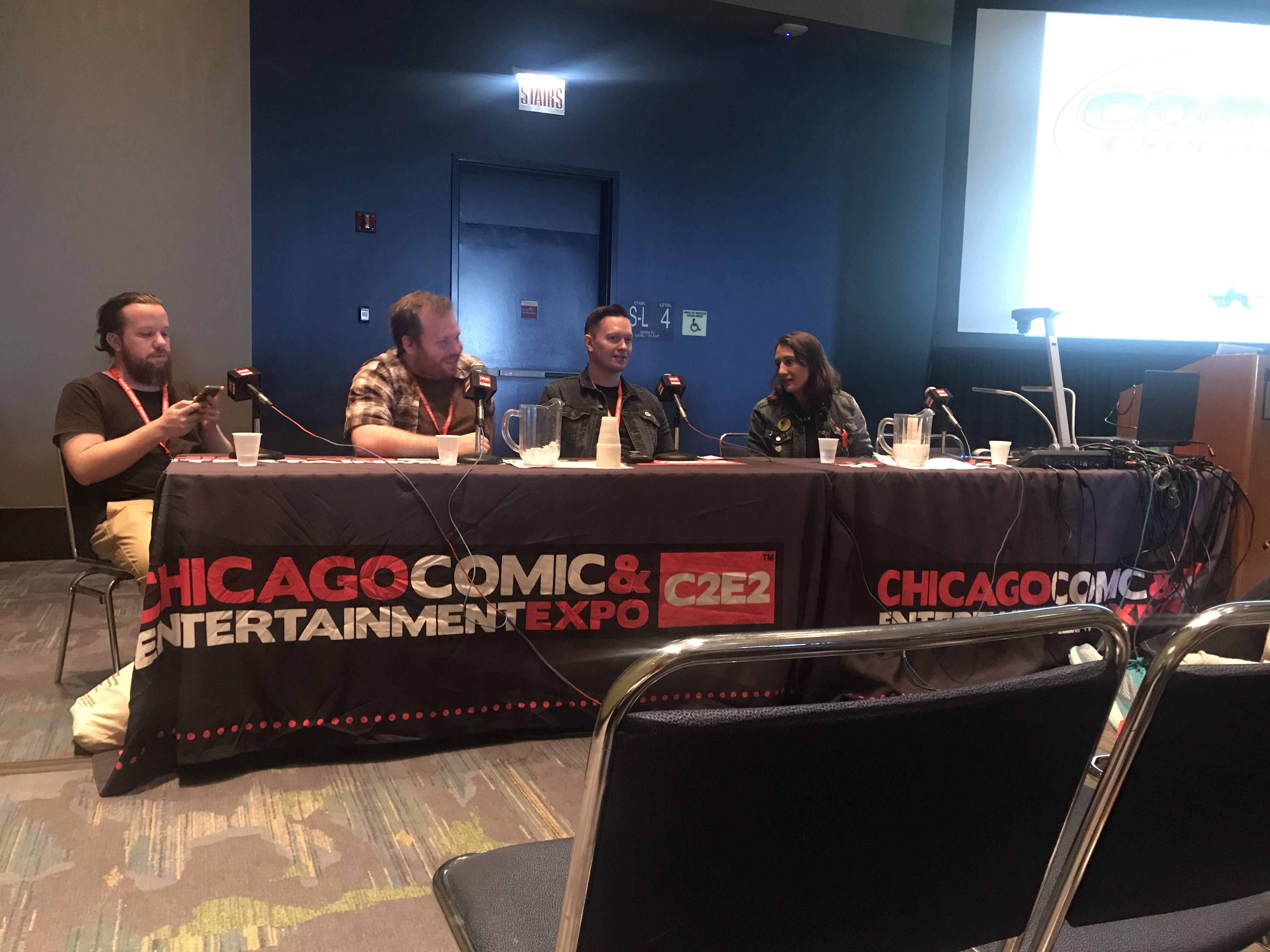A wide array of aspiring comics creators huddled in for Comics Experience’s Breaking into Comics panel on Saturday at C2e2 ’19. Our first panelist, Erica Schultz, is a writer, editor, letterer and teacher recently known for her work on the 2018 Daredevil annual. She’s joined by Frank Gogol, a Comics Experience alum who wrote the Grief anthology as well as the upcoming Dead End Kids. David Pepose, also a Comics Experience alum, penned the popular Spencer & Locke and is looking forward to the release of his upcoming Going to the Chapel. Mat Groom is the writer and co-creator of Self/Made and comes to us from Australia. Finally, Andy Schmidt, former Marvel Editor, serves as moderator. He also spent time at IDW, where he relaunched both GI Joe and Transformers.
More importantly, Schmidt is the founder of Comics Experience, a site dedicated to educating anyone who wants to learn more about making comics. It covers everything in the industry, with a focus on creatorship that includes writing, lettering, art – even law. It’s all online, with students all across the world. A subscription gives access to educational videos, a publishing program and access to professionals.
After explaining Comics Experience, Schmidt dives into discussion. First and foremost, Schmidt says, there is no one way to make comics. Each creator’s story is unique, but there are three fundamentals to every success story: talent, persistence and luck. Each one plays a vital role, but a creator only really needs two of the three to succeed. The third will always follow.
For example, Schmidt says luck is a product of the first two fundamentals. If you’re talented and persistent, luck comes to you. People will find your work and your reputation will grow. With just talent and luck, opportunities will excite you and drive you forward. Even with just persistence and luck, he jokes, people slide through.
At this point, attention shifts to the panelists themselves, who explain a bit of how they got where they are now. Pepose recalls spending three years trying to intern at DC before finally catching a break. After that, he spent another three years at Newsarama, where he was a reviewer and ruminated over the idea of whether or not he wanted to be a comics writer. From there it took a year each to develop, pitch and actually create his first story. He calls the journey a time capsule. It doesn’t come quickly or easily.
Pepose says the rejection is so random that it’s essentially meaningless. It’s bouncing back that matters. Even these panelists, as published creators, are working through denials today, Schultz says.
We then move to Groom’s story. His breakthrough came from hosting a Power Rangers podcast, having then-Power Rangers writer Kyle Higgins on the show and eventually becoming friends with him. Though he never set out to write comics, Groom found himself in a position to network. He was able to meet editors and gain throughway into channels he wouldn’t have otherwise had. He used his outside skills of researching Power Rangers and created a personal style that helped open doors for him. If you want to write comics, he says, don’t do it just to be in comics. Do it because you love the medium.
Gogol, on the other hand, knew for a long time that he wanted to write comics. Although he focused his college education on creative writing, several years after graduation he found himself nowhere remotely near where he wanted to be. So, he doubled down. He found his passion again, picked up classes with Comics Experience and in less than a year he was able to Kickstart his own comic, Grief. Gogol makes time around his work schedule to research and write; he says his story proves that if you work at a skill, you can only get better at it.
Schmidt says this is what he means when he talks about talent. Even if it’s not something you have, it’s something you can get. He’s written video games, apps, television – any opportunity he had to improve himself, he took, knowing that he c always bring those new experiences back to his work in sequential art.
Schmidt transitions, imploring his audience to remember professionalism and kindness always. Turning in work on time, taking feedback from editors and even dealing with fans all affect a potential career. Be courteous to others and they’ll return the favor.
For Schultz, her relationships with editors lead her to opportunities with other publishers. Her work at Marvel helped introduce her to editors across the industry and their knowledge of her reputation connected her to more work, even when her current employer didn’t have the capacity to keep her on the books.
On that note, Schmidt moves to quickly plug some upcoming classes with Comic Experience. Starting April 1, Heather Antos is teaching a course on Kickstarter campaigns, Fred Van Lente will be conducting a course on story arcs, and James Tynion IV will be teaching a master class. Schultz herself will lead a writing class beginning on June 4 and Schmidt is starting up his writing course again beginning June 12.
With that said, the panel opens up to Q&A. The first question pertains to motivation and persistence as an audience member asks how creators keep their momentum going, even when sitting down to practice seems impossible. Pepose says the one thing that keeps him going is love for his concept. Going to the Chapel, which he describes as Die Hard at a wedding, was shot down by several publishers before he finally decided to Kickstart the idea.
Schultz also created a reputation with self publishing. If you want it out there, put it out there, she says. The field is open for anyone who wants in. Schmidt adds that comics are on the rise, especially when it comes to the creator-owned space.
Next, the conversation turns to networking. Another audience member asks how to approach networking when dealing with social anxiety. Schultz advises turning to the internet, and especially Twitter. A small introduction based on experience goes a long way to building a relationship and softens a hard introduction at a comic con where people meet lots of faces.
Schmidt admits himself to overcoming anxiety when he first started. He recalls being calmed remembering that everyone in the industry shares some commonalities. Attendees are here to meet each other and expecting to connect; just be mindful of their time. Gogol adds that just about everyone in the industry is not only used to the anxiety but expect it. Introductions are naturally hard for everyone, and that’s okay.









